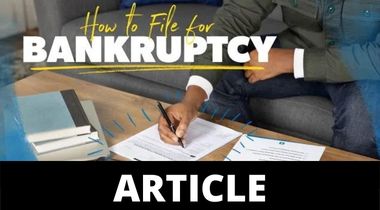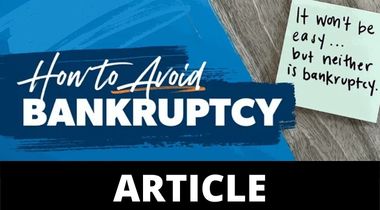The bankruptcy process is legal overseen by the Federal bankruptcy court. It’s intended to help people and companies get rid of the entire or a part of their debts or assist them in repaying a portion of their debt.
A bankruptcy filing can provide relief from your debts. However, it’s crucial to realize that filing bankruptcy can have a significant negative long-term impact on your credit. Your bankruptcy report will be visible on your credit reports for 7-10 years, which will affect the ability you opening credit cards and be approved for loans that have favorable rates.
Basics of Bankruptcy
The bankruptcy process can be a complicated procedure, and the typical person is probably not equipped to handle it independently. Consulting a bankruptcy lawyer will help ensure that the bankruptcy process goes as smoothly as it can and complies with all applicable laws and guidelines that govern bankruptcy procedures.
Bankruptcy Terms to Know
In bankruptcy proceedings, there are likely to be certain legal terms specific to bankruptcy that you’ll need to understand. Here are a few of the most commonly used and crucial terms:
- The bankruptcy trustee is the individual or company chosen by bankruptcy courts acting on behalf of the creditors. The trustee examines the debtor’s petition, liquidates the property in Chapter 7 filings, and disburses funds to the creditors. When filing Chapter 13 filings, the trustee also supervises the repayment plan for the debtor, accepts payment from the debtor, and then distributes the funds to creditors.
- Counseling for credit: Before being allowed to file bankruptcy, you’ll need to attend a meeting either independently or as an organization with a non-profit budgeting and credit counseling company. After sanding and being approved, you’ll be required to participate in a personal financial management course before the bankruptcy is dismissed. In certain situations, the requirements for both could be exempted.
- discharged bankruptcy If the bankruptcy proceedings are completed, the default will be deemed “discharged.” In Chapter 7, this is the case. Chapter 7 occurs after the assets have been sold and the creditors paid. In Chapter 13, this is when you’ve finished your repayment schedule.
- Property exempt from taxation: Although both types of bankruptcy can have you selling assets to pay creditors, certain kinds of property can be exempt from selling. The state’s law determines what debtors are allowed to keep; however, typically, items such as work tools and personal vehicles or equity in the primary residence can be exempt from sale.
- Lien is An legal procedure that permits a lender to hold, take, and then sell the debtor’s property to secure the repayment of a debt.
- Liquidation is the sale of a debtor’s property that is not exempt from taxation. The sale transforms assets into a “liquid” form — cash, then distributed to creditors.
- Measures to test for: The Bankruptcy Code obliges those who wish to declare Chapter 7 bankruptcy to demonstrate that they don’t have the resources to pay their debts. The purpose of this requirement is to prevent abuse by bankruptcy law. The test is based on earnings, assets expenditures, and unsecured debt. If a person fails to pass the test, the Chapter 7 bankruptcy may be removed or converted into the Chapter 13 proceeding.
- Accounts that have been reaffirmed: Under Chapter 7 bankruptcy, you could be able to agree to pay off an outstanding debt which can be discharged during the bankruptcy proceedings. Reaffirming the account and your agreement to pay the debt is typically used to permit a debtor to keep collateral, like the car, which could otherwise be confiscated during the bankruptcy process.
- Secured Debt: Debt backed by properties that are reclaimable. For instance, the mortgage you take out is secured by your home. Likewise, for auto loans, the car itself is collateral. The creditors of secured debt are entitled to take the collateral if you fail to pay in repayment of the loan.
- Credit that is not secured A loan where the creditor is the only one
The Consequences Of Bankruptcy
The most well-known effect that bankruptcy can bring is the loss of property. As we said that both kinds of bankruptcy cases would have you giving up things for sale to pay back the creditors. In certain situations, bankruptcy could result in the loss of the property, vehicle, antique furniture, jewelry, and other kinds of property.
Your bankruptcy could also affect other people financially. For instance, if your parents were co-signers on an auto loan on behalf of you, they could be held accountable for at the very least a portion of that loan if you declare bankruptcy.
Then, bankruptcy may damage your credit. The bankruptcy information is considered harmful on your credit report and may influence how lenders view your credit report. A bankruptcy report on your credit could cause lenders to deny you credit or offer more expensive interest rates or less favorable terms if they decide to grant you credit.
The kind of bankruptcy you file the bankruptcy information could appear in your credit file for as long as ten years. The discharged accounts will change their status to show that they’ve been released, which will be included in your credit reports. Negative information on your credit report is a risk that could affect the credit rating.
A Final Word on Debt Relief
It may adversely affect your credit score when you do not pay off the amount you initially committed to. Certain types, such as bankruptcy relief, come with negative consequences that can be more detrimental and last longer than others. Before you take any action regarding debt relief, such as filing bankruptcy, you need to investigate your options, obtain expert advice from a reputable financial advisor, and be aware of your decisions’ impact on your financial health.
Whatever type of debt relief you select, it is possible to begin improving the quality of credit now by putting the simple positive, responsible actions in practice, such as:
- You must pay all your bills in time.
- Beware of taking on more debt.
- Checking your credit report.
- Setting and sticking to a budget for your personal.
- Utilizing credit in small amounts (such as secured credit cards) and then paying off the balances entirely as soon as possible.


